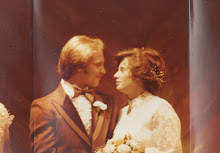"She shall be brought unto the King in raiment of needlework: the virgins her companions that follow shall be brought unto thee. With gladness and rejoicing shall they be brought: they shall enter into the King's palace." (Psalms 45:14 & 15) First of all, let me explain something about honor, because some might think the honor needs to just be given to the King, as it well should; but if you have ever witnessed what happens when the bride enters the back of the room, and as she begins her march down that isle, then you would understand her honor. That is her moment she has been waiting for, that she has dreamt about her whole life; when all eyes are turned towards her, and she is given the honor of being stood to and gazed upon, as she makes her way down that isle. Besides that, if you can accept it still, this is God speaking in the third person about the Son, so the "thee" that is spoken of is the King that is being spoken of, and the Father who is speaking greatly approves of the Bride, and is right there to honor her also. Why would she be honored in such a way? I think the word "needlework" speaks a little into that, much like a tapestry that has too much to behold, the "raiment of needlework" speaks of everything that went into dressing her for this very special day. If you really think about it, if God planned for this from the very beginning of time, as I believe that He did, then that tapestry would be so intense and so complex, it would take forever to take it all in. It's a good thing that we will have for ever to do so, because I am sure that there will be no boredom in heaven. The N.L.T. has a real simple translation of these three verses, 13-15, as it reads, "The Bride, a princess, looks glorious in her golden gown. In her beautiful robes, she is led to the King, accompanied by her bridesmaids. What a joyful and enthusiastic procession as they enter the King's palace." Although it is fun to read, I much prefer the King James, not only for the poetic nature that it is written, but because of the way the thoughts are broken up, such as the last part of verse fifteen, as it says, "they shall enter into the King's palace"; isn't that what it's all about?
"He that is unjust, let him be unjust still: and he which is filthy, let him be filthy still: and he that is righteous, let him be righteous still: and he that is holy, let him be holy still. And, behold, I come quickly; and My reward is with Me, to give every man according as his work shall be. I am Alpha and Omega, the beginning and the end, the first and the last. Blessed are they that do His commandments, that they may right to the tree of life, and may enter in through the gates into the city." (Revelation 22:11-14)
Subscribe to:
Post Comments (Atom)

No comments:
Post a Comment